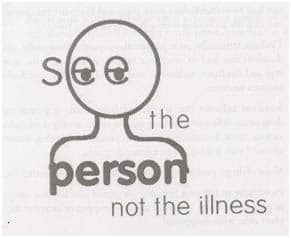… some of his saints do.
“You have a mental illness,” I said to Emma.
We were seated in a small interview room in a local hospital.
Emma a mother of 3 and housewife had been hospitalized for suicidal thoughts. I had just finished her psychological testing and reviewing her results.
It’s been 25 years and I still remember her response,
“Really?”
“I’m so glad!”
The response surprised me then, and even now always catches my attention – including when I heard it again this week. I have come to understand why some people who have suffered for years, are glad to have a mental illness.
For years Emma had tried everything to overcome her depression …. exercise, eating right, reading the scriptures, saying her prayers, starting a new hobby, …. and trying her hardest to feel happy “like everyone else“. But the happiness never came and the depression never left. She could never figure out why the behaviors that seemed to help everyone else, never worked for her.
As a result of Emma’s continued depression she felt guilty -like something was wrong with her as a person, that she just wasn’t good enough. And in recent years…she began doubting the existence of God. Now Emma’s untreated mental illness worsened and she began having suicidal thoughts which prompted her hospitalization.
It never occurred to her that her brain could get an illness, like any other body part.
WHY EMMA WAS “GLAD” TO BE SICK
Learning and accepting she had a mental illness was a relief for several reasons including:
- The problem wasn’t “her as person” but a “brain disorder”. She didn’t need to feel guilty anymore. The depression wasn’t her fault!!
- She finally knew what was going on. She didn’t have to blame herself, her dysfunctional childhood, three kids, etc etc. She now could blame the real enemy – the brain disorder.
- She’s lived many years without any hope of getting better. Doctors know how to treat illnesses. There is now “hope”.
At last she could “learn” about her illness and talk about it openly like any other illness.
UNDERSTANDING “MENTAL ILLNESS”
There are many kinds of mental illnesses (over 200) that affect the way the brain functions. They can affect thoughts, behaviors, emotions, and/or the ability to understand information. Mental illnesses are different from everyday experiences of sadness, feeling upset, or daily problems- that we all experience from time-to-time.
Mental illness makes normal living difficult and interferes with our ability to work, to relate to friends and family, and/or even to participate in recreation or church activities.
With modern research and brain imaging we know now more about mental illness than ever before. If you want to learn about mental illness review these great resources:
National Institute of Mental Health (NIMH) created a curriculum for 6-8 the grades “The Science of Mental Illness.” It’s a little long but very informative-even has a little experiential video- What happens in the brain.
National Alliance on Mental Illness (NAMI) does the best job of education with FREE educational classes usually in your local area. The more popular classes include Family-to-Family for family members of those with mental illness and Peer-to-Peer for individuals with mental illness.
 MENTAL ILLNESS IS A “DISEASE” LIKE ANY OTHER
MENTAL ILLNESS IS A “DISEASE” LIKE ANY OTHER
“Essentially every major mental illness—whether it be schizophrenia, major depression, autism, or attention deficit disorder—has biological underpinnings.” (Mental Illness: In Search of Understanding and Hope, Ensign, Feb. 1989)
The facts are:
Persons with mental illness – simply CANNOT, through an exercise of will power, love, a priesthood blessing etc etc, STOP the disease of mental illness —- anymore then these behaviors could stop cancer, diabetes, etc etc.
Persons with mental illness – with proper professional care CAN ELIMINATE AND REDUCE the symptoms of mental illness—- just like professional care does with cancer, diabetes, etc etc.
The LDS Church recognizes mental illness and the need for professional/medical care on LDS.org see: Understanding Mental Illness.
For example study this quote:
“…Myth #3. All that people with mental illness need is a priesthood blessing….We must understand, however, without in any way denigrating the unique role of priesthood blessings, that ecclesiastical leaders are spiritual leaders and not mental health professionals. Most of them lack the professional skills and training to deal effectively with deep-seated mental illnesses and are well advised to seek competent professional assistance for those in their charge who are in need of it. (Alexander Morrison, “Myths About Mental Illness” Ensign, October 2005)
In the new Handbook for Stake Presidents and Bishops 2010 under Professional Counseling (pg 80) it reads:
“In addition to the inspired help of Church leaders, members may need professional counseling (and medical care).”
And let me share one more from President Harold B. Lee talking about LDS Family Services:
“Our social services program has already been a great blessing to our Church members. This program seeks to respond to many problems that beset our members… and it will no doubt increase in its importance, because so many of the problems which this cluster of agencies deals with are symptomatic of our time. Members may need counselling more than clothing, and members who, through bishops, are referred to an agency in our social services program should feel no more hesitancy in asking for help of this kind [mental illness] than [they] should in requesting help through the priesthood welfare program.” (Harold B. Lee, Seminar for Regional Representatives of the Twelve, Oct. 1970).
Clearly, during our stay here on earth a “brain” with mental illness has the capacity to limit the expression of the Spirit Body and Mind. See FREE -According to the Flesh.
CHALLENGE
Change how you think about mental illness. Watch Change a Mind about Mental Illness.
I assure you that Church leaders, doctors, lawyers, etc etc and you and I – are in no way exempt from experiencing mental illness either as a victim, or as family member.
dr rick
dr rick’s index
